From Market to Home Class 4 Notes EVS Chapter 15
| Table of contents |

|
| Day at Night! |

|
| Preparing for the Day |

|
| In the Bazaar |

|
| Some Fun with Vegetables |

|
| New Words |

|
This chapter tells us about the lives of the sellers in the market, particularly the small vegetable sellers. These sellers buy vegetables from the wholesale market every day and then sell them to customers.
Day at Night!
- Vaishali and her family sell vegetables. They begin their day at 3 o'clock in the morning, even before most people wake up.
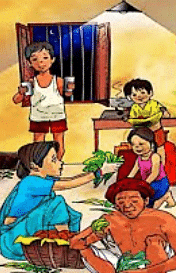
- They start by clearing out the old vegetables to make space for the fresh ones they'll buy from the wholesale market.
- Sometimes Vaishali's younger brother, Chhotu, helps them.
- After a tea break, they listen for the tempo horn, signalling it's time for Vaishali's father, brother, uncle, and neighbours to go to the market.
The learning from Vaishali's family routine is the importance of hard work and dedication in their daily lives, as they begin their day early to ensure fresh vegetables for their customers, showcasing responsibility and commitment.
Preparing for the Day
- While Vaishali's father is at the market, she, her mother, and Chhotu prepare the previous day's vegetables for display by placing them on gunny bags and sprinkling water on them.
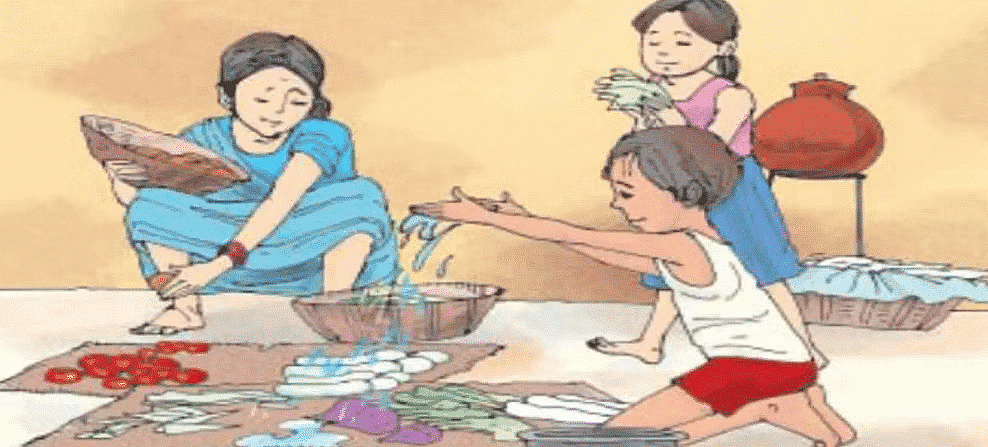
- By 6:30 a.m., her father returns with baskets and sacks filled with fresh vegetables, turning their home into a bustling mini-market. They have various vegetables like brinjals, potatoes, tomatoes, okra, pumpkin, gourds, and chillies to sort through.
- Everyone pitches in to quickly sort the vegetables, setting aside those not yet ripe for selling. By 7 a.m., her father arranges the vegetables on a handcart and heads to the market, emphasizing the importance of being on time to keep regular customers.
- As soon as her father leaves, Vaishali hurries to get ready for school, which starts at 7:30 a.m.
The learning from Vaishali's morning routine is the importance of teamwork and punctuality in managing their vegetable-selling business effectively, demonstrating responsibility and sincerity in their daily tasks. It also tells about how family members help each other out in daily tasks.
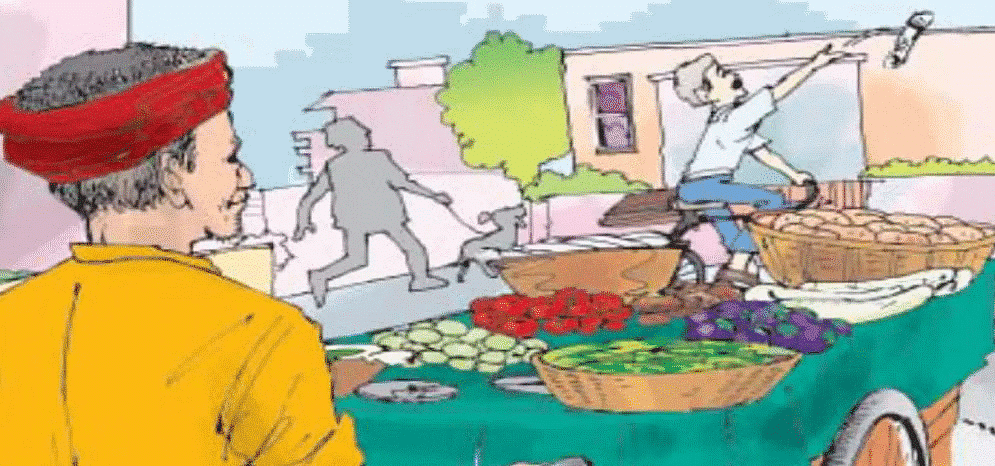
In the Bazaar
- Chhotu goes to school in the afternoon. After resting for a bit, he goes to the market with food for his father, Babuji, and his older brother, Bhaiya.
- He stays with them at the vegetable cart until it's time for him to go to school. Sometimes, after school, he goes back to help Babuji. Babuji makes sure to sell the vegetables from the previous day first.
- As those vegetables are sold, Bhaiya replaces them with fresh ones from the sacks and keeps them hydrated by sprinkling water, especially in hot weather. Babuji and Bhaiya return home around 10 p.m. after a long day.
- By then, Chhotu and Vaishali are asleep. The family usually sleeps around 11 or 11:30 p.m., and they wake up again at 3 a.m. the next morning to start another day.
Vaishali's father always sells the old vegetable stock first before the fresh ones because they would not stay fresh for long. Especially on summer days, he sprinkles water on the vegetables regularly to prevent them from drying up.
Some Fun with Vegetables
- When observing okra (Bhindi), you may find that they are not all the same size.
- They can measure the longest and shortest okra to compare their lengths.
- You may also notice variations in thickness and colour among the okra.
- When cutting two okra lengthwise, they may find that they do not have the same number of seeds.
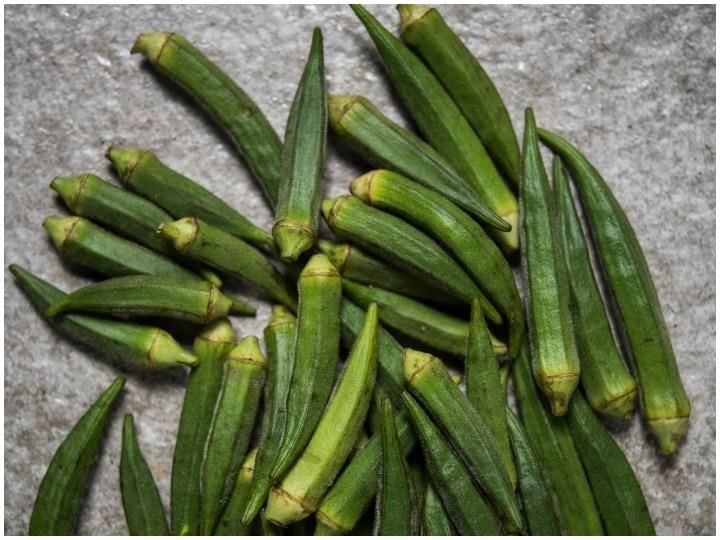
Vegetables
Vegetables are plant parts that are eaten by humans and other animals.
Types of Vegetables
1. Leafy Greens:
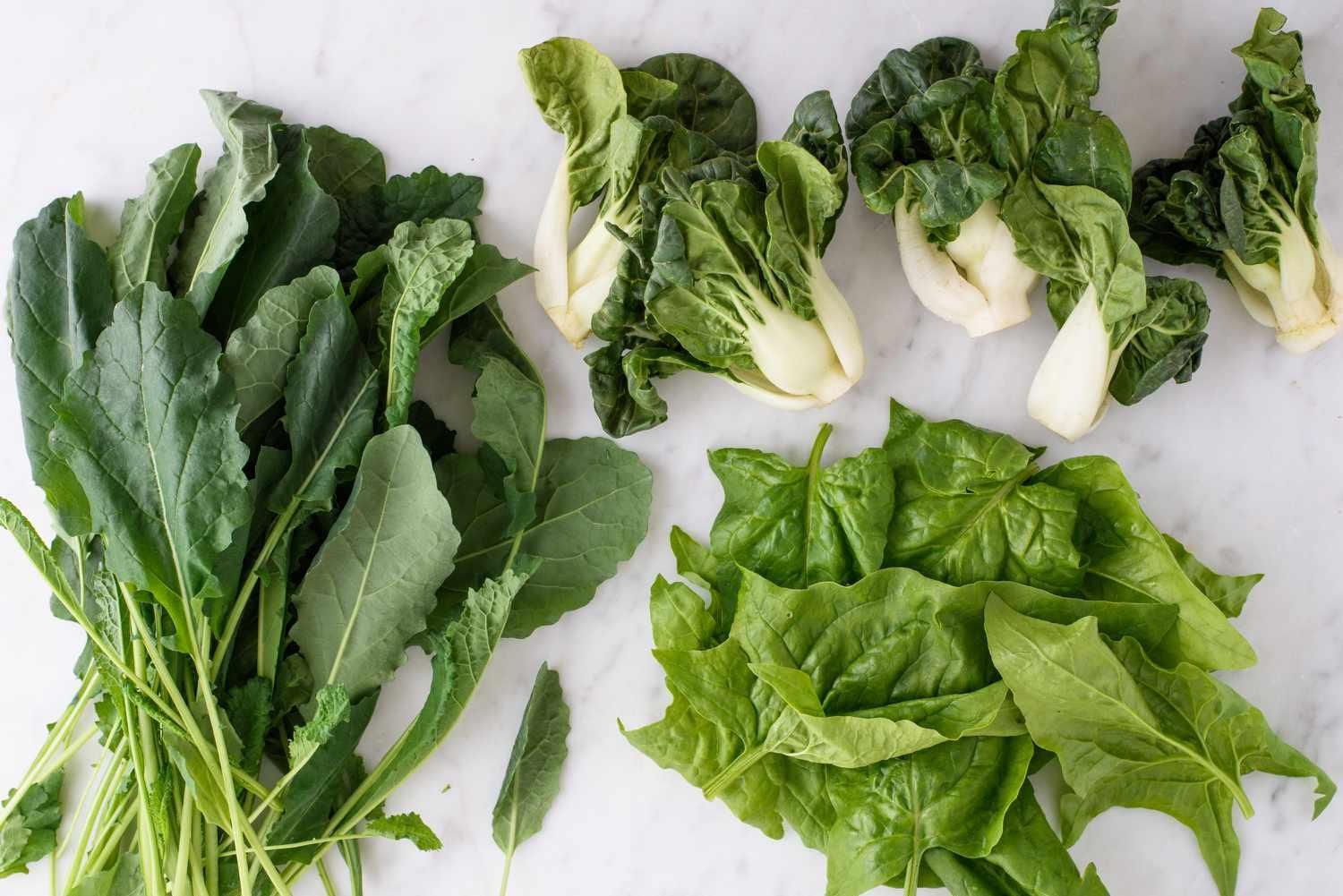
- Leafy green vegetables are plant leaves that are eaten as vegetables, often with tender petioles and shoots.
- Examples include kale, broccoli, spinach, and cabbage.
2. Roots:
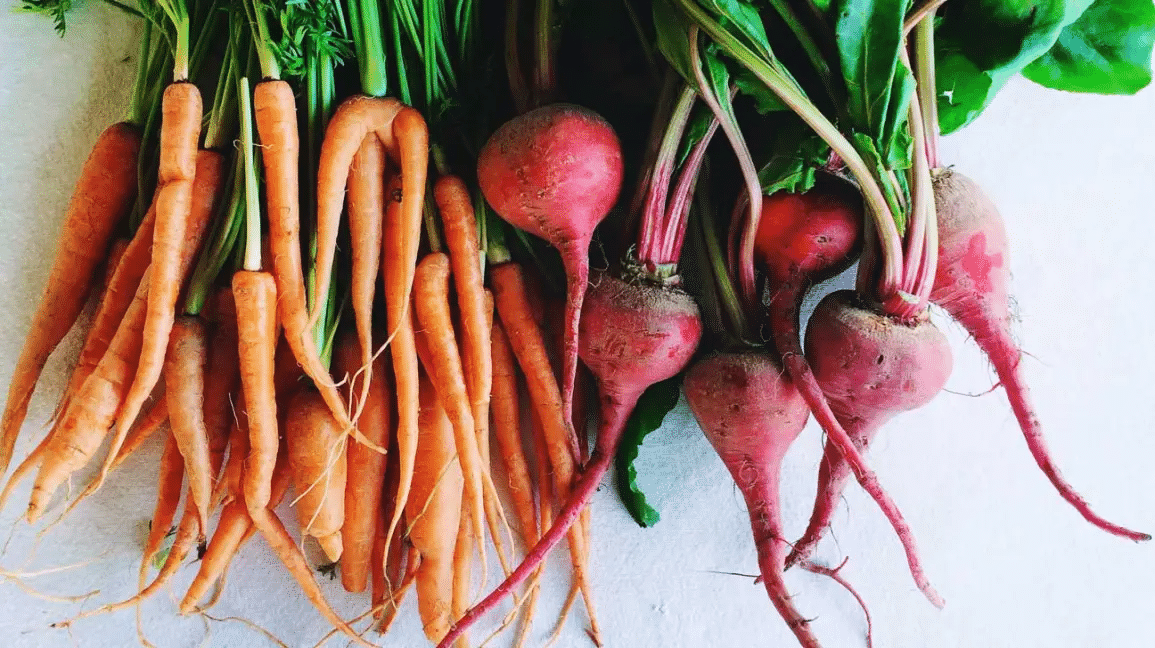
- Root vegetables are underground plant parts that humans consume.
- Examples include beets, parsnips, turnips, rutabagas, and carrots.
3. Nightshades:

- Nightshade vegetables include tomatoes, eggplant, potatoes, and peppers, all belonging to the nightshade family of plants.
4. Edible Plant Stems:
- Plant stems are parts of plants that humans eat, along with roots, leaves, flowers, and fruits containing seeds.
Categorization of fruits and vegetables based on spoilage:
- Spoil quickly: Spinach, Banana, Tomato, Chikoo, Pineapple, Onion, Cabbage, Grapes.
- Stay for some days: Potato, Pear, Gourd, Cucumber, Ginger.
Differentiating between smooth and rough fruits and vegetables:
- Smooth: Banana, Chikoo, Pear, Pineapple, Cucumber, Ginger.
- Rough: Spinach, Potato, Tomato, Onion, Cabbage, Gourd, Grapes.
Heavy and Light Vegetables:
- The heaviest vegetable to carry could be a pumpkin or watermelon.
- The lightest fruit or vegetable could be a grape or a small tomato.
Three vegetables that do not have seeds are potato, carrot, and radish.
New Words
- Mandi: A mandi is a wholesale market where goods, especially agricultural produce like vegetables, are bought and sold in bulk.
- Tempo: A tempo is a small commercial vehicle used for transporting goods, often seen in markets for delivering goods from one place to another.
- Petioles: Petioles are the stalks that attach leaves to the stem of a plant.
- Bazaar: A bazaar is a marketplace or shopping area, often outdoors, where goods are sold by multiple vendors.
- Ripe: Ripe refers to fruits or vegetables that are fully mature and ready to be eaten.
- Sprinkling: Sprinkling means to scatter small drops or particles of a substance over an object or surface.
- Sacks: Sacks are large bags made of strong material, typically used for storing or transporting goods.
- Gourds: Gourds are a type of fruit that includes various species of squash, pumpkin, and melon, typically with a hard outer shell.
- Hydrated: Hydrated means to supply water to something to help maintain its moisture and freshness.
- Sensitise: Sensitise means to raise awareness or make someone more aware of a particular issue or concern.
|
49 videos|217 docs|54 tests
|
FAQs on From Market to Home Class 4 Notes EVS Chapter 15
| 1. What are some activities mentioned in the article "Day at Night!"? |  |
| 2. What can one do in the bazaar according to the article? |  |
| 3. How can one have fun with vegetables as described in the article? |  |
| 4. Why is it important to learn new words as mentioned in the article? |  |
| 5. What is the significance of preparing for the day as highlighted in the article? |  |




















